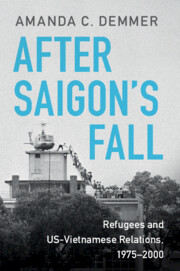Book contents
- After Saigon’s Fall
- Cambridge Studies in US Foreign Relations
- After Saigon’s Fall
- Copyright page
- Contents
- Acknowledgments
- Abbreviations
- Introduction
- Part I 1975–1980
- Part II 1980–1989
- Part III 1989–2000
- 5 Refugees and the Roadmap
- 6 Humanitarian Issues, Human Rights, and Ongoing Normalization
- Conclusion
- Notes
- Bibliography
- Index
6 - Humanitarian Issues, Human Rights, and Ongoing Normalization
from Part III - 1989–2000
Published online by Cambridge University Press: 08 April 2021
- After Saigon’s Fall
- Cambridge Studies in US Foreign Relations
- After Saigon’s Fall
- Copyright page
- Contents
- Acknowledgments
- Abbreviations
- Introduction
- Part I 1975–1980
- Part II 1980–1989
- Part III 1989–2000
- 5 Refugees and the Roadmap
- 6 Humanitarian Issues, Human Rights, and Ongoing Normalization
- Conclusion
- Notes
- Bibliography
- Index
Summary
The humanitarian issues and nonexecutive advocacy that constituted the basis of ongoing US-Vietnamese dialogue in the absence of formal relations remained of pivotal importance before, during, and after Washington and Hanoi resumed formal economic and diplomatic relations in the mid-1990s. Although American policymakers attempted to conclude the humanitarian programs they had earmarked as preconditions to more formal ties, varying definitions of full accounting, the repatriation of migrants to Vietnam through the CPA, and efforts to bring the HO into line with worldwide standards precipitated profound disagreements. Ultimately, US officials moved forward with formal relations with Hanoi and (re)created special programs for South Vietnamese migrants. The 1996 Resettlement Opportunity for Vietnamese Refugees gave screened-out migrants who were repatriated to Vietnam under the CPA one more chance to apply for resettlement in the US.The 1996 McCain Amendment created loopholes to permit the original, exceptional terms of the HO to remain intact. US-Vietnamese collaboration on humanitarian issues, and normalization itself, persisted after the resumption of formal economic and diplomatic relations. The ties between American and South Vietnamese people outlasted both the collapse of South Vietnam and the resumption of relations between Washington and Hanoi.
Keywords
- Type
- Chapter
- Information
- After Saigon's FallRefugees and US-Vietnamese Relations, 1975–2000, pp. 198 - 225Publisher: Cambridge University PressPrint publication year: 2021

